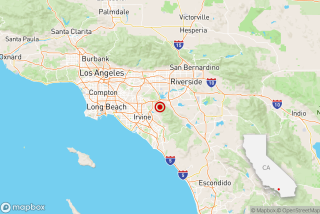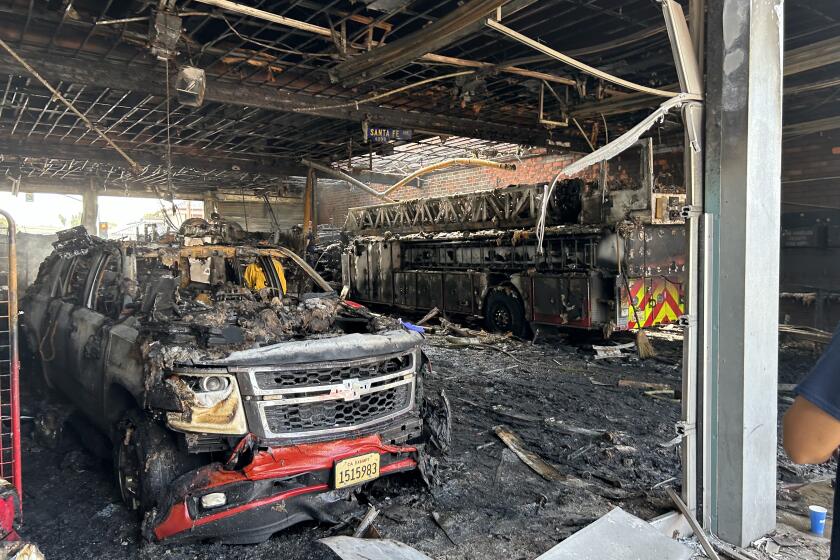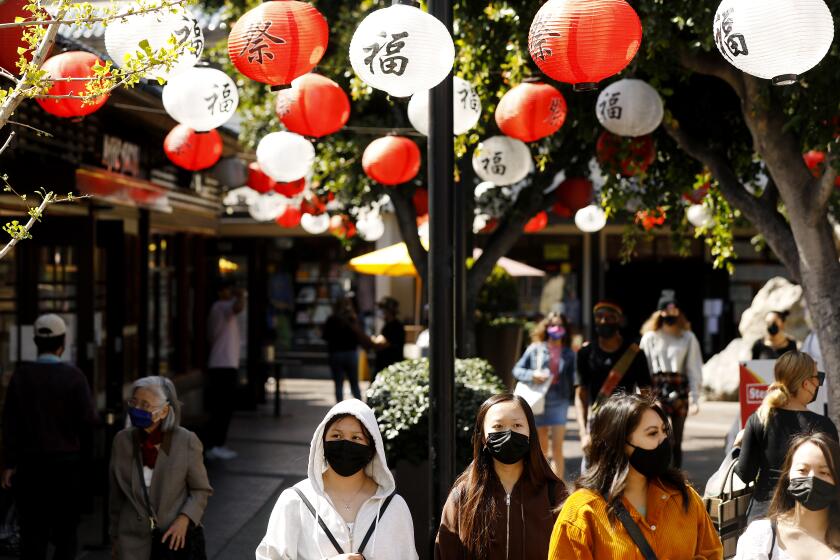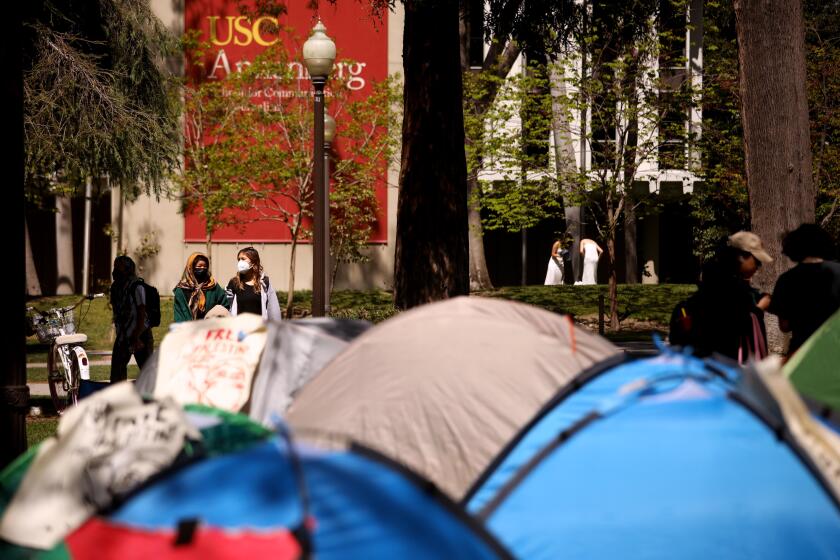Chasing the news all night
It was pushing 11 on a Friday night, and Austin Raishbrook wanted to be prowling the streets of Los Angeles looking for murder and mayhem.
Mired in a pocket of messy downtown traffic, the 32-year-old British transplant clenched the wheel of his Police Interceptor Crown Victoria and cursed out loud. Every few seconds, he turned his attention to the laptop computer glowing beside him, checking for any fresh crash alerts on an internal California Highway Patrol website.
One of the three radio scanners clipped to the visor above Raishbrook’s head crackled to life. A Los Angeles Police Department dispatcher reported gunshots on 110th Street, near Broadway. A victim was lying in the street.
“Agghhh, come on!” Raishbrook growled as a traffic light turned red in front of him.
Reaching the onramp to the Harbor Freeway, he floored the accelerator. The speedometer soared into triple digits.
“With shootings, you need to get there quick enough to get the shot of them loading him into the ambulance,” he said, weaving in and out of lanes and blowing past cars that appeared to be standing still. “Unless he’s dead on arrival. If he’s D.O.A., you’ve got all the time in the world.”
Raishbrook has an identical twin brother, Howard, who also spends most nights in a Crown Vic, monitoring police scanners. The brothers don’t wear badges of any sort. But if it’s late at night in Los Angeles and there is a police pursuit, shootout, terrible car accident or a good-sized fire, chances are they’ll be there. They’ll be the ones with the video cameras.
Call them the paparazzi of pain.
The Raishbrook brothers own RMG News, a news video agency that supplies local and national TV programs with footage of the chaos that plays out each night in and around the city. There is good money in feeding TV news’ insatiable appetite for violence and upheaval. But hang out with the Raishbrook brothers long enough and you begin to believe them when they say they would still be out on the streets even if there wasn’t a dollar to be had.
“To actually be in the middle of it all, the gangs and all. It’s just a visual feast,” Howard said. “I swear on my life, I was put on this planet to film police chases. I swear on my life.”
Austin concurred. “If you’re not living life on the edge, you’re not living life at all,” he said. “You can’t get close enough to the action for me. If you’re covering a fire and not getting burned or wet from the hoses, you’re not close enough.”
Sons of a driving instructor and a schoolteacher, the two were raised in the placid countryside of southern England. As kids, they peeled about on their bicycles, chasing anything with a siren. Home, however, was “filled with old people, cows and fields,” Austin said. “There are only so many cats stuck in trees you can see before you start wanting a little real excitement.”
They became entranced with Los Angeles and images in films and news reports of its gang epidemic. The brothers first came as tourists in 1995. They spent weeks driving around South L.A., Compton and other violent, crime-ridden areas, following police cruisers and ambulances. On subsequent visits they bought video cameras and took the footage home to enthrall friends.
Howard recalls with particular relish the day three floors of a Venice building erupted in flames down the street from where the brothers were staying. He shot 45 minutes of footage -- an eternity compared to the five minute snippets that harried TV news producers demand of them now.
“I remember having all this footage and not doing anything with it!” he said. “I even had footage of an injured firefighter, which is gold these days.”
In 1999, Howard landed a job as film production manager in Hollywood; it allowed him to move permanently to Los Angeles and pursue the hobby with more zeal. Austin followed two years later, when he was hired as an editor at an international photo agency, and joined his brother in the grueling routine that continues today. They regularly stay out on the streets until 3 or 4 in the morning, grabbing a few hours of sleep and then heading to work.
“I live off of Red Bull,” Austin deadpanned.
Until a recent fire destroyed the apartment they shared, the brothers lived together. (Austin was home at the time and, true to form, videotaped his own desperate escape down a smoke-filled stairwell. Sales of the footage topped $10,000.) Both have girlfriends across the Atlantic and claim to want to settle down and start families, but they have shown no signs of slowing down.
“I’ll keep doing this till I can’t get out of bed in the morning,” Austin said with a laugh. “The kids will be strapped down in the back seat.”
They didn’t make a dime off their videos until 2004, when Austin got some exclusive shots of a nasty Ferrari crash and someone suggested that he shop them around.
Today, RMG News is a well-oiled news-gathering force. Along with a third cameraman poached from their main competitor, On-Scene Video, and a younger Raishbrook brother who occasionally joins in, they fan out to several scenes in a night, each often logging 200 miles.
Within minutes of leaving a scene, they blast e-mail alerts from their laptops in their cars to producers at all the local TV news programs.
Local stations pay about $150 to use a clip, while the rate can go as high as $600 for CNN and other national outlets. Each brother routinely pockets between $1,500 and $2,500 a week. In addition, resales of archived footage to shows like “World’s Craziest Police Chases,” earned RMG about $100,000 last year.
And the Raishbrook brothers are quickly becoming their own product. A show scheduled to launch tonight on the TruTV cable channel chronicles the brothers’ work. It seems surprising that it has taken so long for the duo to be discovered. Their adrenaline-soaked nights are custom-made for mass consumption.
On a recent night, Howard was idling in a downtown parking lot around midnight, annoyed with what had been a disappointing night. He had been a few minutes late to a police chase, and a small rubbish fire hadn’t justified even turning on the camera. That all changed when a call came over the radio: a rescue on the southbound Pasadena Freeway.
Howard froze, listening to the few available details. He slammed the car into drive. Peeling onto the serpentine freeway, he topped out at 106 miles per hour .
In the hierarchy of local TV news programs, video of firefighters using the jaws of life or other heavy machinery to extract people from a wrecked car ranks high. Perhaps only police chases are better, the brothers believe.
Within minutes Howard found the wreck in the inbound lanes. Taking an exit, he doubled back through a neighborhood above the freeway. He jumped out of the car, took a running leap and pulled himself to the top of an 8-foot wall. Peering down the steep embankment, he saw the car below, badly smashed and teetering at a sharp angle.
He retrieved his camera, cleared the wall and scampered down through loose dirt, rock and underbrush. A pair of CHP officers had stopped traffic.
“Where the hell did you come from?” one asked with a bemused but wary look on his face. Howard promised to stay out of the way, flipped on the camera’s high-powered light and zoomed in on the car’s unconscious passenger just as the first ambulance arrived. Nearly all the local news programs would buy his footage and play it the next morning.
They enjoy an odd but mostly not hostile relationship with cops and firefighters, who tolerate their presence as long as they don’t interfere.
Without commenting directly on the Raishbrooks, Brian Humphrey, a longtime spokesman for the Los Angeles Fire Department, said freelance cameramen are a mixed bag. They help the department tell its story but also often “push the envelope to get the best shot.”
Most troubling, Humphrey said, are the speeds they reach racing to scenes and their deliberate efforts to look like cops in their Crown Vics, the vehicle of choice for plainclothes officers.
The Raishbrooks profess not to spend much time deliberating over the moral qualms that could arise with the job. They say they live by a simple code that keeps their consciences clear: Help first if you can, shoot second. Early on, after arriving at a few scenes before paramedics, they went so far as to take an emergency-oriented first aid course.
People do accuse them of being crass voyeurs or profiteers trading on other people’s misery, they said. They’re used to brushing the jabs aside.
“I guess I’m of the mentality that everyone wants to see the same things I do,” Austin said. “People want to see it, so we shoot it. If we didn’t shoot this stuff, it would still happen.”
It’s not all excitement and big payoffs.
There is plenty of mind-numbing down time, waiting for something to happen. And sibling jealousy eats at one when the other gets to go to a major blaze or shootout. But for people as addicted to the chase as the Raishbrook brothers, the worst seems to be the gnawing, incessant stress that comes with knowing you could always miss the big one.
The scanners, which troll through hundreds of frequencies used by dozens of agencies, spew out a constant stream of possibilities. Many that sound promising end up duds, and vice versa.
The brothers rarely have a clear sense of what is going on at a scene when first word comes over the radio. Their nights are full of high-pressure, split-second decisions. Howard recently picked up a call about police officers following a suspicious car. Thinking it could turn into a full-blown police chase, he headed for it. When another call came about an overturned SUV in the opposite direction, he fretted over what to do for a few blocks, then pulled a hasty U-turn. His regret was palpable when the accident turned out to be minor and a chase ensued across town.
He and his brother would stay out all night if they could.
“I’m like a gambler who can’t get up from the table and walk away,” Austin said. “I hate calling it a night. If I go in now, I could miss the best pursuit in the world or miss the chance to be in a gang shootout. If I go in, I could miss the greatest night of my life.”
--
More to Read
Start your day right
Sign up for Essential California for news, features and recommendations from the L.A. Times and beyond in your inbox six days a week.
You may occasionally receive promotional content from the Los Angeles Times.







